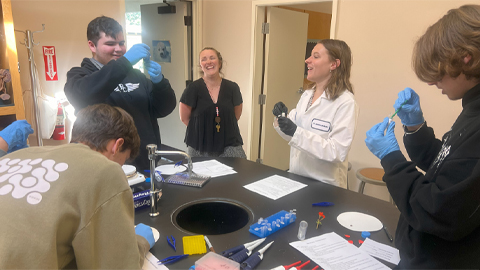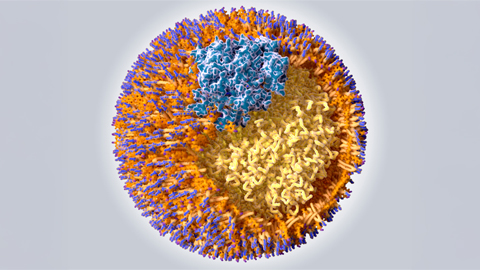Study: Testimonials can open acceptance to differing opinions
It’s hard to change people’s minds, especially on a topic they feel strongly about. But a new study from the University of Kansas shows that testimonials about a person’s lived experience can open people to acceptance of attitudes different than their own on controversial topics. That could go a long way in helping communicators reach people on important topics regarding health, life, death and other difficult to discuss issues, researchers say.
A study surveyed nearly 1,500 people on their attitudes about several controversial issues, including if they were in favor of or opposed to physician-assisted suicide. When they then read a testimonial that gave a moving account of a person’s lived experience with the issue, they were more likely to be receptive to an attitude different than their own than those who read an informative article on the same topic.

“At their core, testimonials are essentially the story of someone’s lived experience. They can be evocative or emotional. But much of the research on narratives tends to focus on much bigger productions like movies, television or books rather than how testimonials or simpler forms of stories affect people, but not on how effective they can be in everyday life,” said Judy Watts, assistant professor of journalism and mass communications at KU and lead author of the study. “Physician-assisted suicide is a very polarizing issue that can elicit complex and mixed emotions. It hit all the areas we are interested in with researching communication processes and persuasion about issues that involve life and death.”
Participants in the study were randomly assigned either a testimonial or an informative article on the topic, so some received a testimonial or article that aligned with their previous beliefs, while others did not. They then answered another set of questions about how they felt on the topic afterward. Those who read testimonials on physician-assisted suicide, whether pro or con, were the most willing to accept or consider the value of opposing views.
“Regardless of baseline attitudes, they were a little more willing to accept the persuasive argument of the testimonial, even when it differed from their own,” Watts said.
Written with co-authors Michael Slater and Emily Moyer-Gusé of Ohio State University, the study was published in the journal Communication Research.
The findings can help communicators craft messages that are more likely to effectively reach their target audiences, especially if it involves a controversial or sensitive topic, the researchers wrote. During the COVID-19 pandemic, testimonials were used frequently to encourage people to take the vaccine, encourage their family members to do so and to take other protective measures. Those came at a time when there was much public debate about the vaccines, masking, business and school closures and other measures that elicited strong reactions.
While movies and larger productions have long known the influence of an engaging story on audiences, many communicators do not have the budgets or other resources to craft such an elaborate message. The findings also show that testimonials can be effective in eudaimonic situations, or when people are striving to do what is meaningful, even if it is difficult to achieve. In a media-saturated environment it is difficult to produce messages that reach people, and better understanding the effectiveness of certain types of communications can help, especially those with limited budgets and means, reach their target audiences, researchers said.
Watts, who conducts research on the influence of media on individuals’ emotional responses, said she hopes to continue studying the effects of testimonials on other topics, including those that might not be as controversial but are still emotionally fraught, such as end-of-life conversations about whether to resuscitate and end-of-life wishes.
“A thoughtful and emotional testimonial can help reach people. We’ll continue to study what happens when people encounter testimonials on topics that might not be easy to discuss but are nonetheless important for health-related decision making and behaviors,” Watts said.
This article was first published by the University of Kansas. Read the original.
Enjoy reading ASBMB Today?
Become a member to receive the print edition four times a year and the digital edition monthly.
Learn moreGet the latest from ASBMB Today
Enter your email address, and we’ll send you a weekly email with recent articles, interviews and more.
Latest in Science
Science highlights or most popular articles

E-cigarettes drive irreversible lung damage via free radicals
E-cigarettes are often thought to be safer because they lack many of the carcinogens found in tobacco cigarettes. However, scientists recently found that exposure to e-cigarette vapor can cause severe, irreversible lung damage.

Using DNA barcodes to capture local biodiversity
Undergraduate at the University of California, Santa Barbara, leads citizen science initiative to engage the public in DNA barcoding to catalog local biodiversity, fostering community involvement in science.

Targeting Toxoplasma parasites and their protein accomplices
Researchers identify that a Toxoplasma gondii enzyme drives parasite's survival. Read more about this recent study from the Journal of Lipid Research.

Scavenger protein receptor aids the transport of lipoproteins
Scientists elucidated how two major splice variants of scavenger receptors affect cellular localization in endothelial cells. Read more about this recent study from the Journal of Lipid Research.

Fat cells are a culprit in osteoporosis
Scientists reveal that lipid transfer from bone marrow adipocytes to osteoblasts impairs bone formation by downregulating osteogenic proteins and inducing ferroptosis. Read more about this recent study from the Journal of Lipid Research.

Unraveling oncogenesis: What makes cancer tick?
Learn about the ASBMB 2025 symposium on oncogenic hubs: chromatin regulatory and transcriptional complexes in cancer.

